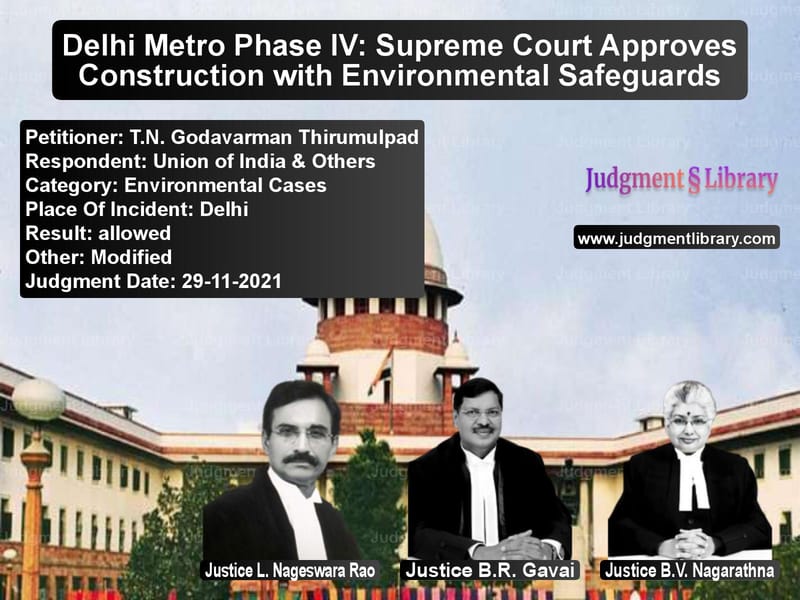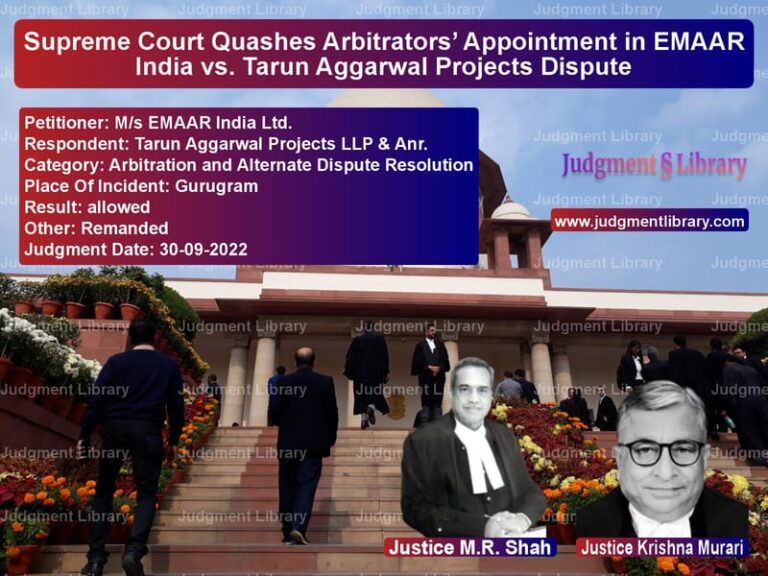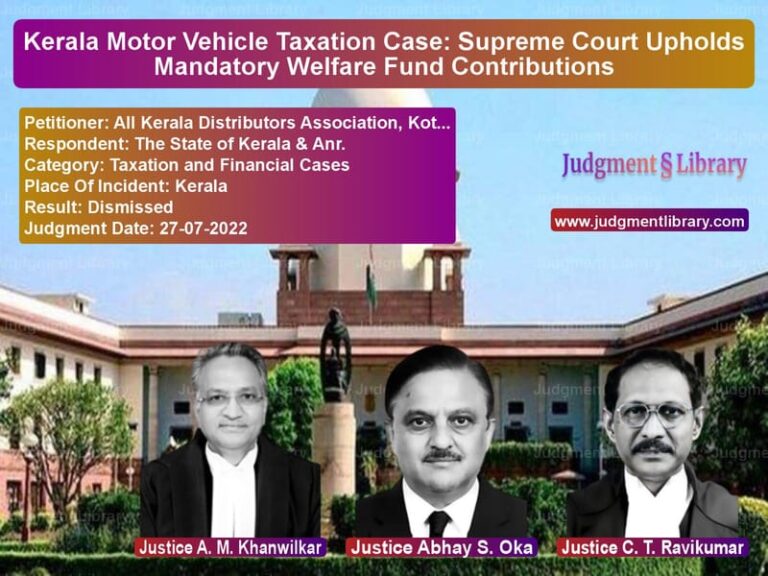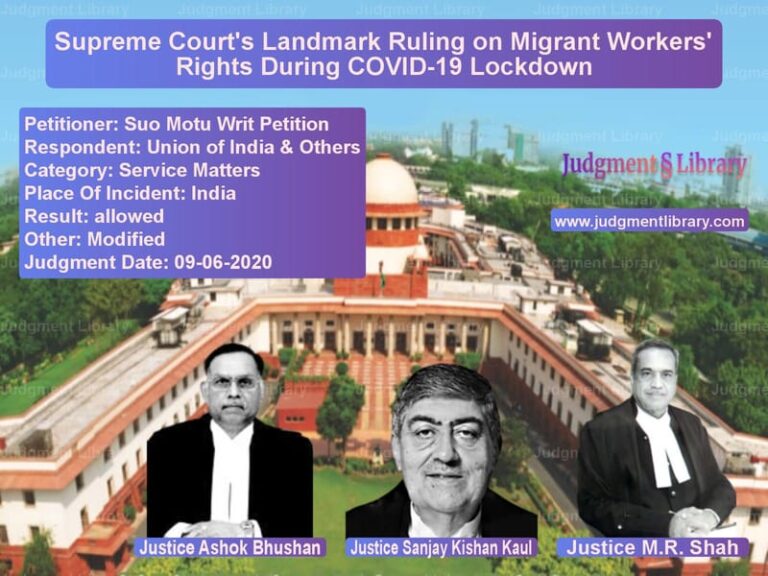Delhi Metro Phase IV: Supreme Court Approves Construction with Environmental Safeguards
The Supreme Court of India has recently ruled on a significant case concerning the construction of Phase IV of the Delhi Metro. The case, T.N. Godavarman Thirumulpad vs. Union of India & Others, addressed the environmental concerns arising from the Metro’s proposed new corridor that runs through protected Ridge areas and other forest land in Delhi. The case was brought before the Court as part of an ongoing effort to balance urban infrastructure development with environmental conservation.
Background of the Case
The Delhi Metro Rail Corporation (DMRC) proposed a 22.34 km-long metro corridor as part of Phase IV of the Delhi Metro network. This corridor, running from Aerocity to Tughlakabad, would significantly improve connectivity in Delhi. However, environmentalists raised concerns about the impact of this construction on forested areas, particularly in the Ridge zone, which serves as the city’s ecological buffer.
The DMRC sought approval from the Supreme Court to carry out construction on lands designated as forest areas and sought a declaration that some of these lands should not be classified as ‘forest’ under the Forest (Conservation) Act, 1980. The case was referred to the Central Empowered Committee (CEC), which submitted a report for the Court’s consideration.
Arguments by the Petitioner
The petitioner, environmentalist T.N. Godavarman Thirumulpad, opposed the construction, citing the following reasons:
- The proposed construction would lead to the destruction of Delhi’s Ridge, which plays a crucial role in controlling pollution and maintaining ecological balance.
- The felling of 6,961 trees as part of the construction process would further degrade Delhi’s already fragile environment.
- The Ridge and other forested areas should not be encroached upon, as they serve as natural carbon sinks and regulate the city’s climate.
- The DMRC should explore alternative alignments that would avoid the Ridge and minimize environmental damage.
- The project was in violation of previous Supreme Court rulings that aimed at protecting forested land in Delhi.
Arguments by the Respondents
The DMRC, supported by the Union of India and the Government of National Capital Territory of Delhi (GNCTD), defended the project on the following grounds:
- The Metro project is crucial for reducing vehicular congestion in Delhi, leading to lower carbon emissions and improved air quality.
- Public transportation projects like the Metro offer long-term environmental benefits by reducing dependence on private vehicles.
- The project had already been planned in a manner that minimized impact on the Ridge and surrounding areas.
- Compensatory afforestation would be undertaken, with over 34,000 trees planted to offset the loss of green cover.
- Similar projects had been approved in the past with environmental safeguards, and this project should not be treated differently.
Supreme Court’s Judgment
After considering the arguments and reviewing the CEC report, the Supreme Court ruled in favor of the DMRC while imposing strict environmental conditions. The Court emphasized that urban development must go hand-in-hand with environmental conservation.
The Court made the following key observations:
“The vehicular traffic from IGI Airport to Delhi will be drastically reduced, leading to a significant reduction in congestion on NH-8, Mahipalpur-Mehrauli Road, and Mehrauli-Badarpur Road. The Metro Project will further provide enhanced connectivity to Tughlakabad for commuters from Faridabad.”
The Court allowed the construction but set forth strict conditions, including:
- The DMRC must deposit 5% of the project cost with the Ridge Management Board for environmental conservation.
- All tree felling must be approved under the Delhi Preservation of Trees Act, 1994, ensuring that necessary safeguards are in place.
- The DMRC must undertake compensatory afforestation by planting 34,000 trees to make up for the ecological loss.
- Transplantation of 2,195 trees must be conducted under scientific supervision to ensure survival.
- The Ridge and forest areas should not be used for any commercial purposes following the construction.
Impact of the Judgment
The ruling sets a crucial precedent for balancing infrastructure development with environmental sustainability. By enforcing compensatory afforestation and requiring environmental contributions from DMRC, the Court ensures that large-scale urban projects are not carried out at the expense of ecological degradation.
The ruling also reinforces the role of the Ridge as a protected area and acknowledges the need for sustainable urban planning. Future infrastructure projects in Delhi and other metropolitan areas are likely to be influenced by this judgment.
Conclusion
The Supreme Court’s decision in this case marks a turning point in the relationship between urban expansion and environmental conservation. While it acknowledges the necessity of the Metro expansion, it also ensures that this development does not come at an irreversible environmental cost.
By enforcing strict conditions such as afforestation, environmental funding, and responsible project execution, the Court has demonstrated that infrastructure growth and ecological preservation are not mutually exclusive. This judgment serves as a model for future development projects in India, ensuring that urban planning remains sustainable and environmentally responsible.
Petitioner Name: T.N. Godavarman Thirumulpad.Respondent Name: Union of India & Others.Judgment By: Justice L. Nageswara Rao, Justice B.R. Gavai, Justice B.V. Nagarathna.Place Of Incident: Delhi.Judgment Date: 29-11-2021.
Don’t miss out on the full details! Download the complete judgment in PDF format below and gain valuable insights instantly!
Download Judgment: t.n.-godavarman-thir-vs-union-of-india-&-oth-supreme-court-of-india-judgment-dated-29-11-2021.pdf
Directly Download Judgment: Directly download this Judgment
See all petitions in Environmental Cases
See all petitions in Public Interest Litigation
See all petitions in Judgment by L. Nageswara Rao
See all petitions in Judgment by B R Gavai
See all petitions in Judgment by B.V. Nagarathna
See all petitions in allowed
See all petitions in Modified
See all petitions in supreme court of India judgments November 2021
See all petitions in 2021 judgments
See all posts in Environmental Cases Category
See all allowed petitions in Environmental Cases Category
See all Dismissed petitions in Environmental Cases Category
See all partially allowed petitions in Environmental Cases Category







